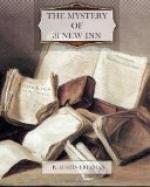“I think I could swear that Mr. Graves had taken a poisonous dose of morphine.”
“And who gave him that poisonous dose?”
“I very strongly suspect—”
“That’s no good, sir,” interrupted the officer. “Suspicion isn’t evidence. We should want you to swear an information and give us enough facts to make out a prima facie case against some definite person. And you couldn’t do it. Your information amounts to this: that a certain person has taken a poisonous dose of morphine and apparently recovered. That’s all. You can’t swear that the names given to you are real names, and you can’t give us any address or even any locality.”
“I took some compass bearings in the carriage,” I said. “You could locate the house, I think, without much difficulty.”
The officer smiled faintly and fixed an abstracted gaze on the clock.
“You could, sir,” he replied. “I have no doubt whatever that you could. I couldn’t. But, in any case, we haven’t enough to go upon. If you learn anything fresh, I hope you will let me know; and I am very much obliged to you for taking so much trouble in the matter. Good evening sir. Good evening, Dr. Stillbury.”
He shook hands with us both genially, and, accepting perforce this very polite but unmistakable dismissal, we took our departure.
Outside the station, Stillbury heaved a comfortable sigh. He was evidently relieved to find that no upheavals were to take place in his domain.
“I thought that would be their attitude,” he said, “and they are quite right, you know. The function of law is to prevent crime, it is true; but prophylaxis in the sense in which we understand it is not possible in legal practice.”
I assented without enthusiasm. It was disappointing to find that no precautionary measures were to be taken. However, I had done all that I could in the matter. No further responsibility lay upon me, and, as it was practically certain that I had seen and heard the last of Mr. Graves and his mysterious household, I dismissed the case from my mind. At the next corner Stillbury and I parted to go our respective ways; and my attention was soon transferred from the romance of crime to the realities of epidemic influenza.
The plethora of work in Dr. Stillbury’s practice continued longer than I had bargained for. Day after day went by and still found me tramping the dingy streets of Kennington or scrambling up and down narrow stairways; turning in at night dead tired, or turning out half awake to the hideous jangle of the night bell.
It was very provoking. For months I had resisted Thorndyke’s persuasion to give up general practice and join him. Not from lack of inclination, but from a deep suspicion that he was thinking of my wants rather than his own; that his was a charitable rather than a business proposal. Now that I knew this not to be the case, I was impatient to join him; and, as I trudged through the dreary thoroughfares of this superannuated suburb, with its once rustic villas and its faded gardens, my thoughts would turn enviously to the quiet dignity of the Temple and my friend’s chambers in King’s Bench Walk.




